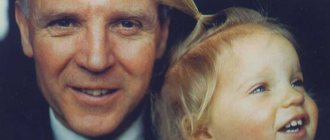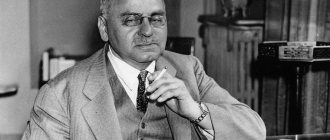The biggest shortcoming of psychoanalysis, Maslow believed, is the tendency to consider mental development from the point of view of the organism's adaptation to the environment. His main idea was that a person, not striving for balance with the environment, on the contrary, wants to explode this balance, because it is death for the individual. The basis for the development of man and society as a whole is self-actualization, i.e. desire for development and personal growth.
Maslow’s personality theory also actively opposes the tendency to reduce all mental life to role-playing behavior characteristic of behaviorism.
It is necessary to study human nature, Maslow believes, but it is necessary to study its best representatives; this is the only way to explore the boundaries of human capabilities and understand the true nature of man.
Are you an expert in this subject area? We invite you to become the author of the Directory Working Conditions
Existentialist view of man
It originates from a concrete and specific awareness of the uniqueness of the existence of an individual person. This person exists at a specific moment in time and space. Existentialists believe that man does not exist outside the world and the world has no meaning without the people living in it. They emphasize the idea that each person is responsible for who we are and what we become—the first principle of existentialism. Thus, they believe that every person is challenged to make life meaningful in this absurd world. From their point of view, people experience the pain of despair, loneliness, anxiety, because they realize that they are responsible for their fate.
Finished works on a similar topic
Coursework Theory of Personality by A. Maslow 430 ₽ Essay Theory of Personality by A. Maslow 260 ₽ Test Theory of Personality by A. Maslow 240 ₽
Receive completed work or specialist advice on your educational project Find out the cost
The freedom of choice given to people does not mean that they will act in their own interests, and does not at all guarantee that the choice will be impeccable and wise. Existential philosophy appeals to humanistic psychology, because believes that every person is responsible for his or her actions, hence humanistic psychology takes the responsible person as its basic model.
“I am my choice,” said Sartre. Humanistic psychologists have extracted an important concept from existentialism - this is the concept of becoming, in which a person always finds himself. A person who refuses to become means that he refuses to grow and create a worthwhile, meaningful life. Existentialists call this betrayal, therefore, naturally, those who betrayed their human essence are unable to resolve the basic issues of their existence.
The only “reality,” existentialists argue, that anyone knows is a subjective reality, not an objective one.
Motivation: hierarchy of needs
The question of motivation is perhaps the most important in all of personology. Maslow (1968, 1987) believed that people are motivated to strive for personal goals and that this makes their lives meaningful and purposeful. Indeed, motivational processes underlie the humanistic theory of personality. Maslow described man as a “desiring being” who rarely achieves a state of complete, unsurpassed satisfaction. A complete absence of wants and needs, when (and if) it exists, is short-lived at best. When one need is satisfied, another comes to the surface and directs the person's attention and efforts. When one person satisfies him, the other loudly demands satisfaction. Human life is characterized by the fact that people almost always want something. Maslow proposed that all human needs are innate or instinctive, and that they are organized into a hierarchical system of priority or dominance. The figure schematically depicts this concept of the hierarchy of needs in human motivation.
This framework is based on the assumption that the dominant needs located at the bottom must be more or less satisfied before a person can become aware of the presence of needs located at the top and be motivated by them. Therefore, one type of need must be fully satisfied before another type of need can emerge and become effective. Satisfying needs lower in the hierarchy allows needs higher in the hierarchy to become conscious and participate in motivation. Thus, physiological needs must be sufficiently satisfied before safety needs arise... physiological and safety needs must be satisfied to a certain extent before belongingness and love needs arise and must be satisfied. According to Maslow, this sequential arrangement of basic needs in a hierarchy is the basic principle underlying the organization of human motivation. He assumed that the hierarchy of needs applied to all people and that the higher a person could rise in this hierarchy, the more individuality, human qualities and mental health he would exhibit.
Maslow acknowledged that there may be exceptions to this hierarchical arrangement of motives. He recognized that some creative people are able to develop and express their talent despite serious difficulties and social problems. There are also people whose values and ideals are so strong that they would rather go through hunger and thirst, or even die, than give them up. For example, social and political activists in South Africa, the Baltic countries and Eastern Europe continue to fight despite exhaustion, imprisonment, physical deprivation and death threats. The hunger strike organized by hundreds of Chinese students in Tiananmen Square is another example. Finally, Maslow proposed that some people create their own hierarchy of needs through characteristics of their background. For example, people may prioritize esteem needs over love and belonging needs. These people are more interested in prestige and promotion than intimacy or family. However, in general, the lower the hierarchy of needs, the stronger and more priority they are.
The key point in Maslow's hierarchy of needs concept is that needs are never all or nothing. Needs overlap, and a person can be motivated at two or more levels of needs simultaneously. Maslow suggested that the average person's needs are met approximately as follows: 85% physiological needs, 70% safety and security, 50% love and belonging, 40% self-esteem, and 10% self-actualization (Maslow, 1970). Moreover, the needs that arise in the hierarchy develop gradually. People not only satisfy one need after another, but also partially satisfy and partially satisfy them at the same time. It should also be noted that it does not matter how high a person has risen in the hierarchy of needs: if the needs at lower levels are no longer met, the person returns to that level and remains there until those needs are sufficiently satisfied.
Now let's look at Maslow's categories of needs and find out what each of them entails.
The individual as a whole
At the heart of Maslow's humanistic position, the most fundamental thesis is that each person must be studied as a single, unique, organized whole. He understood that psychologists had long focused on detailed analysis of individual events rather than on the person as a whole, so his theory initially developed as a protest against such theories.
Maslow believed that the human body always behaves not as a set of differentiated parts, but as a single whole. The whole organism will be affected by what happens in some part of it. The scientist believes that motivation affects not only individual parts of the body, it affects the person as a whole. The central characteristic of personality for him is indispensable unity and community.
Self-actualization
Abraham Maslow identified the characteristics of people who are close to self-actualization:
- adequate perception of reality, a feeling of comfort in reality;
- acceptance of oneself and others, the ability to build deep relationships;
- the ability to follow your desires;
- spontaneity of actions, naturalness and simplicity;
- ability to focus on a task;
- need for privacy;
- independence;
- the ability to create, the ability to give a fresh assessment of what is happening;
- mysticism, can be in higher states;
- democracy;
- the ability to distinguish between ends and means, good and evil;
- sense of humor.
According to Maslow, not everyone succeeds in achieving self-actualization. People often do not see their potential, they are afraid of their talents and possible success. Sometimes the environment hinders the development of abilities. Development requires a safe and friendly environment.
Inner nature of man
By placing the internal nature in his construction of a self-actualizing personality and man as such, Maslow says that the internal nature of a person is not expressed as strongly and clearly as in animals. She easily becomes a victim of habit, the pressure of civilization and inadequate attitude, because she is weak and vulnerable.
Unlike animals, a person can act both against and contrary to his own nature. The inner nature of a person, in order to become effective and active, needs awareness and sanction from a higher personal authority, and Maslow identifies a special type of consciousness. The function of this type of consciousness is to reflect on a person’s own inner nature. The basis of this internal consciousness of a person is the unconscious and preconscious perception of one’s own nature, destiny, abilities, calling to life.
Thus, the inner nature is not that which acts “by itself” and “for itself.” This is the nature that reminds a person of itself very modestly and not always distinguishable voices-impulses.
Nature, which must be listened to and which can be ignored, is nature rather in its genesis, rather than in status.
If we characterize the inner nature in moral categories, then, according to Maslow, it is either morally neutral or reveals “good” in a person. When the inner nature is ignored, suppressed, and destroyed, “evil” appears in a person’s life. Every person naturally has the potential for positive growth and improvement. Maslow maintained this optimistic and exalted view of humanity throughout his life.
Psychology from Maslow's point of view
Abraham Maslow (1966) did not trust the methods of mainstream psychology. According to him, traditional scientific methods do not enlighten us, but prevent us from fully understanding human nature. Psychological theory and research do not focus on the most important aspects of human nature—the higher functions that distinguish us from animals. Of course, we, like animals, eat, reproduce and learn. However, the development of people allows them to go beyond these primitive processes. A theory that is limited to these levels cannot explain healthy personality any more than a theory of color vision can explain what we see in Picasso's paintings. In addition, Maslow criticized theories based on clinical experience with neurotic individuals who had not realized their full human potential. Health is more than the mere absence of disease or disorder.
Psychology tended to adopt rigid scientific forms, and Maslow argued that such efforts undermined the very purpose of psychological science. The strict science could only consider certain phenomena, leaving out many interesting things. Traditional scientific methodology is method-centered. Those human experiences that cannot be studied in the traditional way are declared “unscientific.” Instead, Maslow recommended a problem-centered that prioritizes the questions to be studied rather than the methods. This view was shared by other humanists, such as Carl Rogers. Gordon Allport, although considered a trait theorist, also advocated a problem-centered focus. Maslow expressed his opposition to the method-centered approach in the following statement: “You should not do well what should not be done at all” (Maslow, 1966).
Like the philosophy of science, neither scientific determinism nor logical positivism has succeeded in turning psychology toward the unique human experiences confronted by personality theorists and clinicians. As an alternative philosophy, Maslow (1968b) proposed existentialism because of its emphasis on experiential knowledge and the search for identity. If psychology seeks to understand the deep meaning of life, the “ultimate loneliness of the individual,” and the true uncertainty of the future, then it must move beyond the more limited deterministic theories found in behaviorism and psychoanalysis. psychology was born , largely influenced by existentialism. Maslow is widely recognized as the spiritual father of this new third force, American humanism.
Maslow did not want to completely abandon traditional scientific methods. Rather, he wanted to supplement them with a more honest recognition of the experimental basis of the problems under study. Rather than focusing on externally observable symptoms and behavior, Maslow was interested in people's subjective experiences. Empirical methods for testing hypotheses must then be constructed on the basis of this empirical knowledge. Any emphasis, taken alone, turns out to be inadequate: a methodology without a “soul” or empirical knowledge without cross-validation of the scientific method. According to Maslow (1966), both of these approaches are less antagonistic than is commonly believed. He noted that “emotion is not always the enemy of truth and objectivity.”
Once traditional methodology proves inadequate, innovative methods must be developed to understand normal personality. Maslow (1966) struggled to define such a new approach. He described his ideas as Taoist science, which he contrasted with “controlling science.” Taoist science should be subjective and based on life experience, rather than objective and abstract. She must honor and even love the object of study, instead of treating it with cold indifference. It must be interpersonal (in the spirit of the “I-thou” approach of Martin Buber), truly participating in interpersonal interaction with the object of research. It must not insist on the false separation of observer and subject. In another way it could be called “an alloy of knowledge.” Moreover, it must openly address values. All these considerations flout traditional views on scientific methods, which, according to Maslow, cannot adequately study healthy individuals.
The only obstacle to the development of such science is the limited development of scientists as human beings. Traditional science sometimes functions as a defense mechanism, promising safety and predictability. When studying higher human capabilities, scientists tend to experience resistance to the truth because the topic challenges them personally, whereas this is not the case with nonhuman or clinical topics (Maslow, 1966).
Brief background
Until the beginning of the twentieth century, all psychology boiled down to locking patients in certain institutions and calling priests (optionally exorcists). Then Grandfather Freud appeared.
He stated that somewhere inside a person sits It - the unconscious , and you can help with mental problems by pulling out this unconscious, experiencing it and comprehending it.
Where it came from was not specified, so psychologists actively used the method of psychoanalysis, but could not substantiate it. But science prefers clear explanations.
In addition, in Freud, most of the disorders are explained by repressed sexual experiences, and people really did not want to be those who are guided only by sexual instinct.
The theory of behaviorism, which soon appeared - behavioral psychology - did not go far. Her followers believed that the human psyche is a set of reactions to stimuli (fortunately, not only sexual ones). An explanation was required that would make a person a little more humane.
It became the humanistic theory. Carl Rogers said that a person has a unique experience - a “phenomenal field”, which distinguishes him from others.
Problems begin when this field does not coincide with reality. Maslow developed these ideas.
How does Bert Hellinger's constellation method work? Read about it here.







